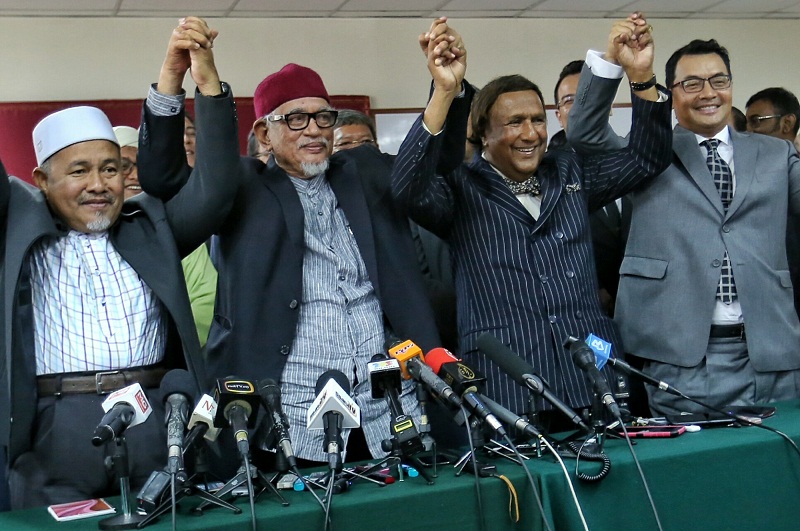KUALA LUMPUR, March 17 — The new partnership between PAS and Parti Ikatan Bangsa Malaysia (Ikatan) is simply a vehicle for the Islamist party to try and remain pertinent to Malaysian politics, according to political analysts.
Pointing to Ikatan’s obscurity among local political parties, they added that it brought few tangible benefits to the pact beyond allowing PAS to claim that it has a multicultural and multiracial partner.
Wan Saiful Wan Jan, chief executive of the Institute for Democracy and Economic Affairs (IDEAS), said that while the partnership was a major coup for Ikatan, it sent a less flattering signal regarding PAS.
“Ikatan is unknown to many and this partnership would definitely boost its name in the political arena, but as for PAS, it shows a sign of desperation for teaming up with a not so famous party.
“It is as if PAS is trying to tell Malaysian politics ‘Hey, look at me, I have a friend, too!’ and probably make Pakatan Harapan a little jealous in the process,” he said.
Wan Saiful was also sceptical of the long-term viability of the new bloc, noting that both presidents — PAS’ Datuk Seri Abdul Hadi Awang and Ikatan’s Tan Sri Abdul Kadir Sheikh Fadzir—have contradicting political views.
Chief among this is Hadi’s continued ambitions to enforce hudud, the Islamic penal code, which prompted the hostilities with former ally DAP and eventually led to the break-up of Pakatan Rakyat.
During the announcement of the new pact yesterday, both parties refused to explicitly state Ikatan’s position on hudud save that it respected PAS’s right to try and introduce the Islamic penal law through “democratic means”.
Wan Saiful said that while Ikatan was diplomatic on the topic yesterday, former Umno minister Abdul Kadir previously said that he was against the implementation of hudud in Malaysia.
“So, I am not sure how long these two are going to stay together,” he said.
For analyst Dr Faizal Hazis, the PAS-Ikatan pact was a less than ideal fit both for each other and the local political landscape. He also predicted that Ikatan would end up being dominated by PAS as the Islamist party continued to push its Islamic values.
The associate professor at the Institute of Malaysian and International Studies (IKMAS) in Universiti Kebangsaan Malaysia said the public would also view the pact as a “PAS party” rather than a coalition of multiracial parties.
“Ikatan is a new party and it will take years for it to gain traction. Just like DAP, it took the party more than 30 years to land some results in the Sarawak state elections.
“For Ikatan to replace DAP and PKR, it wouldn’t happen today or tomorrow,” he said.
On whether this team-up was engineered to help PAS appear more multiracial ahead of the Sarawak polls, Faizal said it could be the case, but added that it was unlikely to make any significant impact on Barisan Nasional or Pakatan Harapan.
He believed that both parties would only perform well in PAS strongholds, of which there are none in East Malaysia.
“Honestly, I am really dumbfounded as to why PAS chose to form an alliance with Ikatan. The party has no representation in the Parliament and not to mention, it is an Umno splinter group without any track record,” he said.
When contacted, pollster Ibrahim Suffian said the partnership was likely forged as an attempt to rehabilitate PAS’s appeal with the non-Malays as well as to present a more moderate front among voters living in the more ethnically-mixed seats.
The programme director at polling house Merdeka Center described Ikatan as a “small party” with hardly any grassroots presence.
“It is very unlikely that Ikatan will get much of a following among voters. It is going to be uphill for them to gain new support in a political arena that is filled with many old political brands,” he said.
Abdul Hadi and Abdul Kadir yesterday announced the alliance between their two parties, forming what they billed as the third political bloc after BN and Pakatan Harapan.
Ikatan was launched last May after a two-year struggle to get itself registered.
PAS was previously in partnership with PKR and DAP as Pakatan Rakyat after the landmark Election 2008. Their pact crumbled last year following disagreements between the conservative Islamist party and the DAP.



















